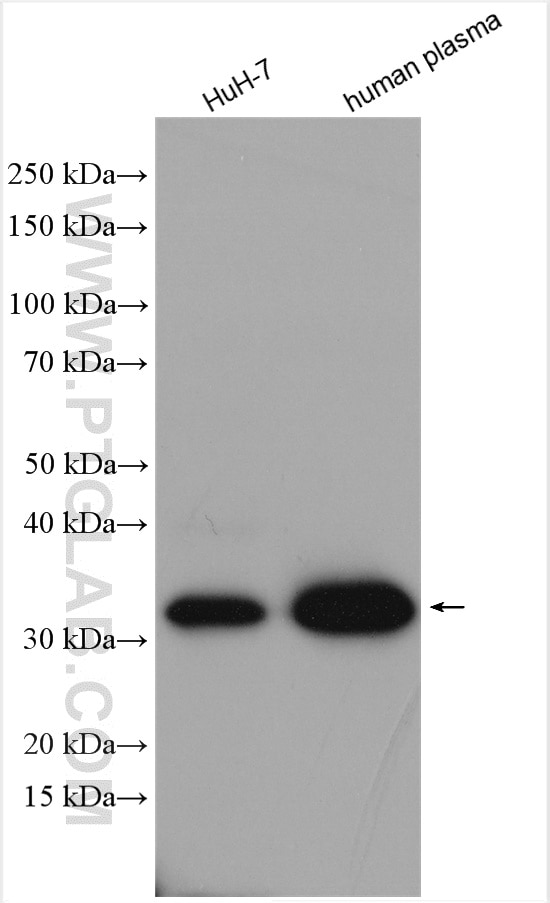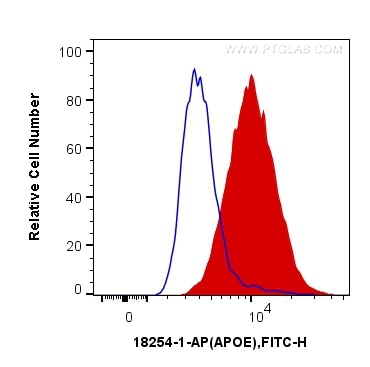APOE Polyklonaler Antikörper
APOE Polyklonal Antikörper für FC, WB, ELISA
Wirt / Isotyp
Kaninchen / IgG
Getestete Reaktivität
human, Maus
Anwendung
WB, IHC, IF, FC, ELISA
Konjugation
Unkonjugiert
Kat-Nr. : 18254-1-AP
Synonyme
Galerie der Validierungsdaten
Geprüfte Anwendungen
| Erfolgreiche Detektion in WB | HuH-7-Zellen, human plasma, mouse serum |
| Erfolgreiche Detektion in FC | HepG2-Zellen |
Empfohlene Verdünnung
| Anwendung | Verdünnung |
|---|---|
| Western Blot (WB) | WB : 1:1000-1:6000 |
| Durchflusszytometrie (FC) | FC : 0.40 ug per 10^6 cells in a 100 µl suspension |
| It is recommended that this reagent should be titrated in each testing system to obtain optimal results. | |
| Sample-dependent, check data in validation data gallery | |
Veröffentlichte Anwendungen
| WB | See 12 publications below |
| IHC | See 2 publications below |
| IF | See 3 publications below |
Produktinformation
18254-1-AP bindet in WB, IHC, IF, FC, ELISA APOE und zeigt Reaktivität mit human, Maus
| Getestete Reaktivität | human, Maus |
| In Publikationen genannte Reaktivität | human, Maus |
| Wirt / Isotyp | Kaninchen / IgG |
| Klonalität | Polyklonal |
| Typ | Antikörper |
| Immunogen | APOE fusion protein Ag13070 |
| Vollständiger Name | apolipoprotein E |
| Berechnetes Molekulargewicht | 36 kDa |
| Beobachtetes Molekulargewicht | 34-38 kDa |
| GenBank-Zugangsnummer | BC003557 |
| Gene symbol | APOE |
| Gene ID (NCBI) | 348 |
| Konjugation | Unkonjugiert |
| Form | Liquid |
| Reinigungsmethode | Antigen-Affinitätsreinigung |
| Lagerungspuffer | PBS mit 0.02% Natriumazid und 50% Glycerin pH 7.3. |
| Lagerungsbedingungen | Bei -20°C lagern. Nach dem Versand ein Jahr lang stabil Aliquotieren ist bei -20oC Lagerung nicht notwendig. 20ul Größen enthalten 0,1% BSA. |
Hintergrundinformationen
The apolipoprotein E (APOE) is a 299-amino acid polypeptide that mediates the binding, internalization, and catabolism of lipoprotein particles, and also serves as a ligand for the LDL (apo B/E) receptor and for the specific apo-E receptor (chylomicron remnant) of hepatic tissues. The very strong association of the APOE ɛ4 allele with AD risk and its role in the accumulation of amyloid β in brains of people and animal models solidify the biological relevance of APOE isoforms but do not provide mechanistic insight. APOE can be detected 43kDa and 69kDa dimers (PMID: 9831633).
Protokolle
| Produktspezifische Protokolle | |
|---|---|
| WB protocol for APOE antibody 18254-1-AP | Protokoll herunterladen |
| FC protocol for APOE antibody 18254-1-AP | Protokoll herunterladen |
| Standard-Protokolle | |
|---|---|
| Klicken Sie hier, um unsere Standardprotokolle anzuzeigen |
Publikationen
| Species | Application | Title |
|---|---|---|
Br J Cancer A new panel of pancreatic cancer biomarkers discovered using a mass spectrometry-based pipeline. | ||
J Genet Genomics Comprehensive lipidomics in apoM-/- mice reveals an overall state of metabolic distress and attenuated hepatic lipid secretion into the circulation. | ||
Hum Cell Serine protease HtrA2/Omi regulates adaptive mitochondrial reprogramming in the brain cortex after ischemia/reperfusion injury via UCP2-SIRT3-PGC1 axis. | ||
Pulm Pharmacol Ther Protective effects of adipose-derived biogenic nanoparticles on the pulmonary microvascular endothelial barrier in mice with ventilator-induced lung injury via the TRPV4/ROCK1 signalling pathway. | ||
Autoimmunity Inclisiran inhibits oxidized low-density lipoprotein-induced foam cell formation in Raw264.7 macrophages via activating the PPARγ pathway. |



